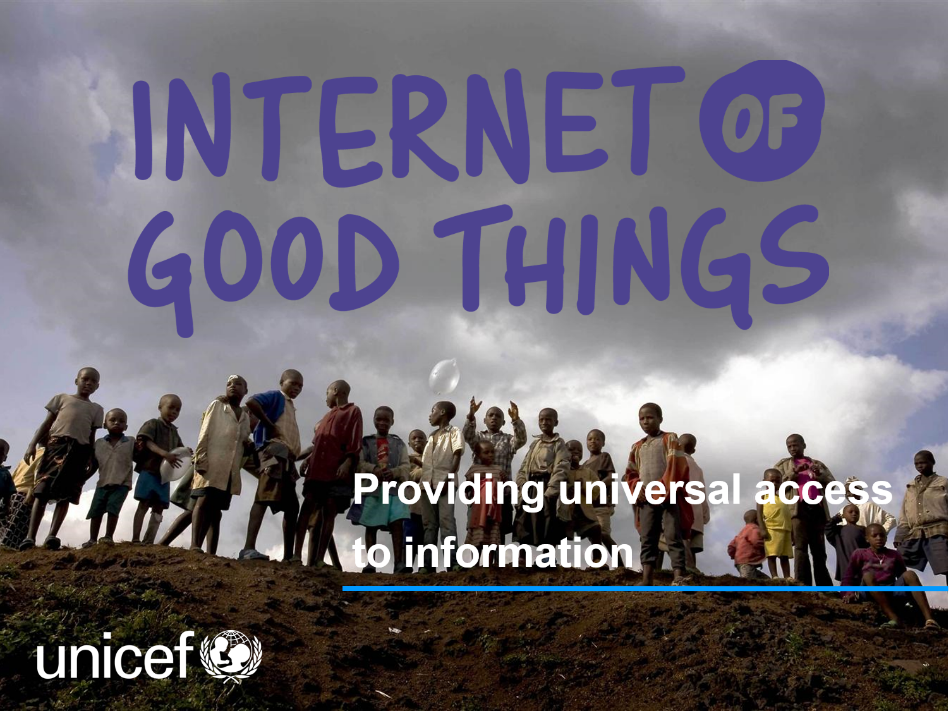By Guillaume Michels, Product Manager at UNICEF Innovation Unit
Equity is an ideal that I love to pursue everyday through the work I am doing with UNICEF. You know the feeling. When you know there are situations where solutions exist, you can see it and you know that the opportunity is there to have an impact and make the world a better and fairer place for everyone. We're living such a historic moment, the planets are aligning.
Let's take a minute to think of today's situation and why it's important we live to our promise to deliver a universal access to information. More than half of humanity is still not online and has no access to basic lifesaving information. However we know that due to constant investment from Mobile network operators in the infrastructure about 85 % of the world's population could access it. Also new low orbiting satellite, solar powered drones or balloon technology are promising and represent a fantastic opportunity to provide connectivity to the entire world.
Mobile penetration has never been as high. In Africa and Asia and the Pacific, mobile penetration has reached 69% and 89%, respectively, by end 2014. Today, the majority of total mobile subscriptions are still for basic phones. However this is rapidly changing, and by 2016 the number of smartphone subscriptions will exceed those for basic phones as they become increasingly affordable in developing markets. 90% of the world's population over 6 years old will have a mobile phone by 2020.
Lack of access to information is still a leading cause of death and an inhibitor for growth. Bridging the digital divide is of paramount importance as we need to be addressing the inequality in access to information.
They say information is power but it's not just power, it's well being, health, opportunities, social interaction, it's life.
5+ million children die every year from preventable illness before reaching their fifth birthday. There were approximately 250,000 new HIV infections among adolescents in 2013, two thirds of which were among adolescent girls. AIDS is the leading cause of death among adolescents 10–19 years old in Africa. By reaching communities with information about how to prevent the spread of HIV and other communicable diseases, we can help save lives.
Now imagine you are an adolescent girl living in a remote area of Tanzania and you have questions you are too embarrassed to ask about pregnancy, love or sexual protection. It can be difficult to seek advice or find answers to your questions. But what if you could easily access this information online via your mobile phone and it cost you absolutely nothing. Wouldn't it be just normal and fair? Living in a small community and having little spare change to buy a data plan shouldn't impede the youth from finding information that protect them.
With the help of distribution partners UNICEF is providing free access to regularly updated educational content and lifesaving information, helping to bridge the digital divide and connect those who are currently disconnected.
Providing quality education and vital messages and information will help children grow and develop to their full potential. It will also help mothers, fathers, other family members, caregivers and communities to save and protect the lives of children.
It's all the opportunities that it brings. You might know the famous quote: “If you have an apple and I have an apple and we exchange these apples then you and I will still each have one apple. But if you have an idea and I have an idea and we exchange these ideas, then each of us will have two ideas.”
Think about it, by providing a greater access to information and the ability to collaborate online, students can learn skills relevant to future careers; mothers can learn skills on how to protect children; adolescents can learn about their rights, citizens and communities are provided the tools to report issues and work as positive agents of change…
We live in a world of information and we should thrive for everyone to have access to it.

Did you know?
-
Internet of Good Things (IoGT), a set of free to access web-based resources and applications is already deployed in 30 countries – 8 in Eastern and Southern Africa
-
More than 3.3 million users have accessed IoGT web resources as of September
-
UNICEF and partners content on IoGT is currently accessible in 19 languages
Guillaume Michels is a product manager at UNICEF.






























